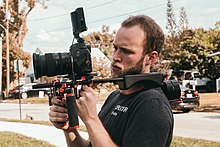The video industry is ripe with hard-working creatives and big thinkers, people who have the ability to turn ideas into captivating and inspirational visuals.
But the one thing video people can't seem to do is agree on what to call themselves.
Does language define our perception of reality? Do the words we use limit our understanding of possibilities? And can what we call ourselves actually transform the kinds of people we become?
Most importantly, does our self-described job title help or hinder our ability to get work?
Come along as we explore the many different identities we throw around in the videography world, and whether our assumptions and interpretations have any truth to them.
CHOOSING YOUR VIDEO PRODUCTION SERVICES
If you've seen our infographic and article on Video Production Services, you'll know that the general public has an intensely difficult time hiring video producers. It's because there are hundreds of different types of videos, but not an easy cataloging system to describe what kind of video is called by what name.
And so, clients are intimidated and confused whenever they contact a videographer for the first time, because they can't easily say what kind of video they want, in a way that a filmmaker would understand right away. Instead, the first conversation often steers towards discussion of budget and video duration, to describe what the client wants, rather than the video content and style.
That article is intended to be helpful for both video creators and marketing clients, and we're glad to see it's been spread throughout the production industry, including on the ProductionHub blog.
But in researching video types and all the different ways we describe them, we also discovered that there are many misconceptions within the videography industry itself. And it stems from a deep belief in our professional identities being tied to the words we choose for ourselves, and the words the public chooses to call us.
VIDEOGRAPHY VS. CINEMATOGRAPHY VS. FILMMAKING
At its core, the argument between videography and film making or cinematography comes down to our own perceptions, despite what the public assumes to be true.
Filmmakers tend to believe they are creative, producers of art, standard bearers for quality and craftmanship.
To a filmmaker, a videographer is someone who stands at the back of a room, turns on a camera, and documents a boring event.
To be a filmmaker, however, is to exist on a higher plane in the echelon of video makers. Incidentally, it has nothing to do with using film anymore, since the vast majority of filmmakers use digital cameras.
But when a client is searching for someone to hire for a video project, they don't make the same assumptions.
In fact, "videographer" is one of the most common search engine keywords that marketing professionals use when looking for a vendor.
So to a filmmaker who wants to market themselves as a creator of high end video content, he or she could be losing out on lots of potential work, simply because they don't want to describe themselves as a videographer.


ليست هناك تعليقات:
إرسال تعليق